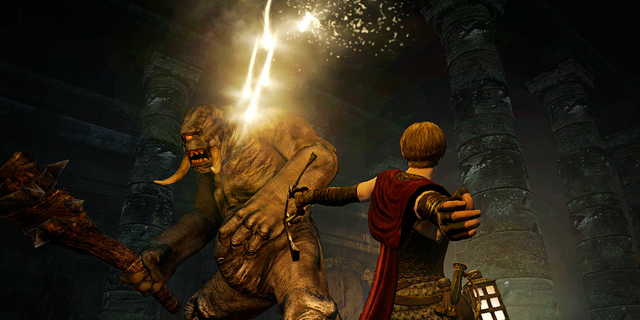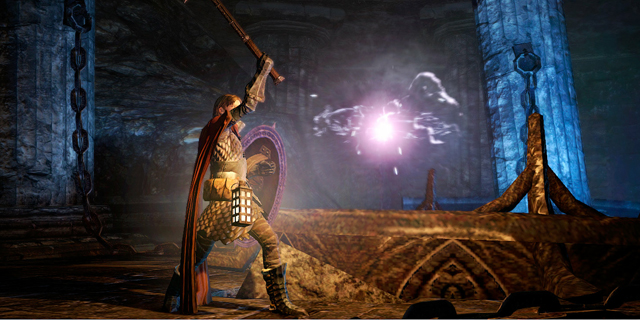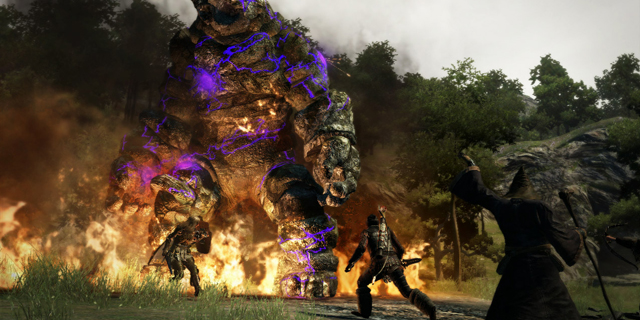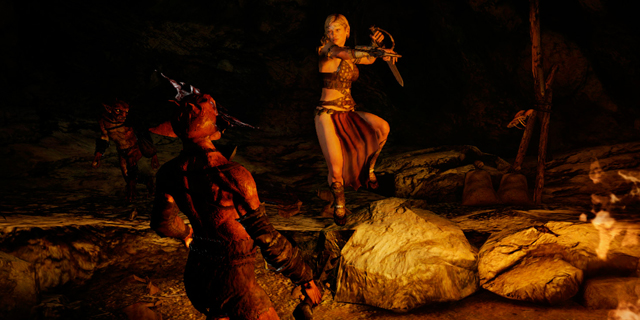
Capcom is attempting something entirely different with Dragon’s Dogma. Similar in some respects to their popular Monster Hunter franchise, this fantasy RPG seems to be Capcom’s take on popular western RPGs such as the Elder Scrolls series. It features an expansive, open world and an interesting take on RPG combat. This is one of the strangest games I have ever played, leading me to wonder if I can actually call this a huge success or a complete failure. Maybe it’s a bit of both.
If you’re coming to Dragon’s Dogma for a compelling story, interesting characters, or a world rich with fiction, you’re looking at the wrong game. It becomes immediately apparent that there isn’t much going for this world, or a reason for you to care for the story (what little of it there is). The majority of the game involves you being given piles of quests, most of which seem to be busywork, until eventually you reach a brief sequence of story that seems like it has potential but ends before that happens. There is an ending, and it’s great, but everything leading up to it seems so meaningless.
This also leads to main objectives being vague. There are several instances when a story event will occur and you are told something seemingly important, but given no real guidance towards your next goal. Sometimes you are able to check your chronicle, a log book that details important events in the story, to lead you to your next objective should you need it, but that doesn’t happen often enough. There were several instances where I had no clear idea of what was happening in the story, leading to confusion with my available quests. The quest structure itself can be cluttered as well. If you plan on worrying about only the main story quests, you’re in for some confusion. On the other hand, if you plan on tackling everything Dragon’s Dogma has to offer, you shouldn’t have many problems.

On top of that, the world itself is uninteresting, making traveling way more tedious than it needs to be. There are no compelling reasons to explore, and the exploration that is required seems needless and dull. You rarely have any reason to actually explore the world, outside of looking for the next enemy encounter or quest marker. It all feels like padding a ten-hour title to be 20-plus hours. And without a reliable fast travel system (one that doesn’t rely on spending a ridiculous amount of gold to use), it turned what could have been an enjoyable world to explore into areas you will hate backtracking through countless times. Creating an open world is one thing, but giving it a purpose is something entirely different, and it’s the biggest problem facing Dragon’s Dogma.
Besides the enemy encounters, there is really nothing else happening in this world. The day and night system has promise, with certain quests only able to progress at certain times of the day, but during long travel sessions it simply becomes another thing to worry about. At night, you run into different enemies, or stronger versions of enemies you have already encountered. It really adds nothing to the experience; it merely exists to bog down the dreadful task of wandering through the world.
Combat, on the other hand, is Dragon’s Dogma’s greatest strength. No matter what class (or vocation, as they are called) you choose, there is plenty of fun to be had. The combat feels entirely satisfying, and fights with larger enemies, such as a cyclops or a griffin, are have a real sense of scale to them. The ability to climb onto enemies plays a large role in taking them down. While it’s not perfect, it’s a unique approach to what you would typically expect from a game like this. The biggest surprise was finding out just how much fun using a bow was as it quickly became the weapon I used the most during fights.

As with any RPG, each vocation has its own sets of strengths and weaknesses. There are no clear best vocations, but there are plenty that will play to your own strengths and how you typically approach battles. They are separated into three categories: basic, advanced, and hybrid. The basic vocations are what you start out with, but as you progress through the game, you’ll discover the advanced and hybrid vocations. Advanced focus more on more specific skills in the basic vocations while hybrids combine different vocations to create something entirely new.
For example, if you start as a strider, a basic vocation focused on dual daggers and a bow, you can change to a ranger, an advanced vocation that uses a long bow and has more bow skills. But if you want more magic, you might find yourself using a magick archer, a class that combines skills of a mage and a strider. The level of customization involved in choosing your vocations (which you can change at any time). Each vocation has a separate set of skills and levels up separately from your actual character progress.
And then there are your pawns, soulless, human-like beings that assist you during battles. You begin the game with one pawn and are quickly shown how to create your own. If you are connected online you can recruit other pawns from fellow Dragon’s Dogma players, including people on your friend list who are currently playing. This is one of the game’s best features as it shows the full flexibility of the character creator and gives the player numerous, pre-created options in terms of what party members they want to go with. It’s always good to have a balanced team, but it’s also good to switch pawns regularly depending on the situation.

However, pawns aren’t entirely smart. You can customize their personalities based on how you want them to act during battles, which is helpful, but you never have any real sense of control over their actions during battles. There are commands you can give them, but they rarely listen to these commands and the commands themselves are vague. You are simply left hoping that the pawns will act accordingly based on the battle at hand, but this isn’t always the case. I ran into problems warriors running around during battles with seemingly no idea how to proceed and sorcerers not casting spells that would easily turn the tide of battle. This isn’t always the case, but when the A.I. fails, it fails spectacularly.
It’s hard to fault Capcom for trying something as ambitious as this. The developers wanted to attempt something new, but despite the strong levels of customization and the very enjoyable combat, the end result is a soulless game. With a stronger focus on building a more exciting world to explore and some major A.I. improvements, this could have been an instant classic. As it stands, Dragon’s Dogma is merely a sometimes fun, sometimes infuriating experiment that never quite lives up to those lofty ambitions.
Pros: Pawn system is creative, fun and varied combat, great character and class customization
Cons: Dull and uninspired world, lack of a compelling story, plenty of A.I. problems



















